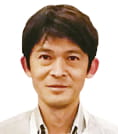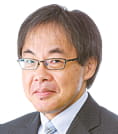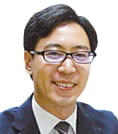- JST Home
- /
- Strategic Basic Research Programs
- /
 CREST
CREST- /
- Research Director/
- Revolutional material development by fusion of strong experiments with theory/data science/
- [Revolutional Materials Development] Year Started : 2018
[Revolutional Materials Development] Year Started : 2018
Tomoyasu Taniyama
Interfacial multiferroic materials
Grant No.:JPMJCR18J1
Research Director
Tomoyasu Taniyama

Professor
Graduate Schcol of Science
Nagoya University
Collaborator
| Takashi Kimura | Professor Graduate School of Science Kyushu University |
| Yoshihiro Gohda | Associate Professor School of Materials and Chemical Technology Tokyo Institute of Technology |
| Kohei Hamaya | Professor Graduate School of Engineering Science Osaka University |
Outline
A novel approach to efficiently designing interfacial multiferroic materials with gigantic magneto-electric correlation is developed by solving inverse problems with inputs from experiments, high-throughput first principles calculations, and Bayesian optimization, which allows of the screening of the materials and interfaces. The preeminence of interfacial multiferroics in materials will be demonstrated by verifying its potential for a variety of innovative device applications such as electric field contol of magnetization, gating technology of thermal rectification, and microwave technology.
Tatsuo Hasegawa
Development of applicable electronic materials by fusion of experimental, computational, and data sciences
Grant No.:JPMJCR18J2
Research Director
Tatsuo Hasegawa

Professor
Graduate School of Engineering
The University of Tokyo
Collaborator
| Hiroyuki Matsui | Professor Graduate School of Organic Materials Science Yamagata University |
Outline
This project aims to develop a novel methodology for searching and exploring liquid-form-applicable electronic materials exhaustively and systematically, based on a fusion of experimental, computational, and data sciences. On this basis, we study to develop and sophisticate the materials and their device processing toward industrial application of the printed electronics technology. The following topics are investigated: development of a technique to explore and design molecular materials with use of crystal structure database and machine learning; prediction of precise molecular packing structures and electronic functionalities with use of computational science; synthesis, structure analyses, and evaluation of actual materials and their uses for verifying the computational predictions; development and optimization of techniques for thin-film processing and electronic device fabrications.
Yoshihiro Yamazaki
Development of novel proton-conducting inorganic compounds based on materials science and machine learning
Grant No.:JPMJCR18J3
Research Director
Yoshihiro Yamazaki

Professor
Platform of Inter-/Transdisciplinary Energy Research (Q-PIT)
Kyushu University
Collaborator
| Yuji Okuyama | Professor Faculty of Engineering University of Miyazaki |
| Akihide Kuwabara | Chief Researcher Nanostructure Research Laboratory Japan Fine Ceramics Center |
Outline
Intermediate-temperature operation of solid oxide fuel cells (SOFCs) would mitigate their cost: it does not need expensive noble metal catalysts and high-temperature structural materials in the system. The intermediate temperature operation, however, has not yet been realized since there is no appropriate electrolyte with proton conductivity higher than 0.01 S/cm at the intermediate temperatures and high chemical stability in a long operation. In this project, we aim to develop such inorganic compounds based on high-proton conduction. As the developing tools, we will combine materials science experiment, machine learning, and theoretical calculations.
Akiyasu Yamamoto
Development of polycrystalline superconducting materials and magnets based on superconducting materials informatics
Grant No.:JPMJCR18J4
Research Director
Akiyasu Yamamoto

Associate Professor
Institute of Engineering
Tokyo University of Agriculture and Technology
Collaborator
| Kazumasa Iida | Professor College of Industrial Technology Nihon University |
| Yusuke Shimada | Associate Professor Faculty of Engineering Sciences Kyushu University |
| Satoshi Hata | Professor Department of Advanced Material Science and Engineering Kyushu University |
| Akinori Yamanaka | Professor Graduate School of Engneering Tokyo University of Agriculture and Technology |
Outline
Transport properties in superconducting polycrystalline materials have been major issues in both materials science and applications. In particular, the transport of macroscopic superconducting current is influenced by the presence of grain boundaries, microstructure and anisotropy in addition to the intrinsic physical properties within the grains. In this project, we will develop a model for predicting the transport properties of such complicated polycrystalline materials. By establishing control methodologies of the intra-grain superconducting property upper limit based on experiment, theory and calculation, and the microstructure based on advanced materials processing, grain boundaries formation simulation and process machine learning, we will propose a new style of materials science to develop a superconducting material as a strong magnet at high speed.













